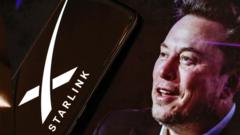The ongoing dispute between Starlink, the satellite internet service provider linked to Elon Musk, and the South African government highlights critical issues around racial empowerment laws and international diplomatic relations. Recently, Musk took to his platform X, claiming that Starlink was denied the ability to operate in South Africa due to his race, stating, “not allowed to operate in South Africa simply because I'm not black.” However, the Independent Communications Authority of South Africa (Icasa) clarified that Starlink had never submitted an application for a required operating license, undermining Musk's assertion.
To operate in South Africa, companies like Starlink must adhere to local laws mandating that 30% of ownership be held by historically disadvantaged groups, primarily the black population, as a legacy response to the racial injustices of apartheid. While Musk has interpreted these conditions as exclusionary, the South African foreign ministry has emphasized that Starlink can enter the market if it complies with regulations. Their spokesperson pointed out that many American companies operate successfully in South Africa, illustrating that compliance can be achieved.
Despite these clarifications, there is speculation that the South African government might be open to revising these empowerment laws. Communications Minister Solly Malatsi from the Democratic Alliance (DA) has hinted at potential policy changes to facilitate Starlink's entry, which could involve high levels of local investment aimed directly at benefiting black South Africans without necessitating equity ownership. This proposal has met with skepticism from ANC lawmakers who remain staunch advocates for current empowerment measures.
Relations between the South African government and the United States have also become strained, particularly against the backdrop of Donald Trump's tenure. Musk's statements echo sentiments shared by Trump, maintaining that the current laws are discriminatory against certain demographics, igniting debates about race and economic equity.
In a strategic move, President Cyril Ramaphosa appointed Mcebisi Jonas, a former deputy finance minister, as a special envoy to the US to mend diplomatic ties, which have suffered significantly. South Africa, faced with the threat of increased tariffs from the US, recognizes the necessity of rebuilding relations to safeguard its economy.
Compounding the situation, Starlink has made significant strides in other African nations where regulatory frameworks differ. Countries such as Nigeria and Somalia have welcomed its services, while Musk's dialogue with the South African government continues to remain contentious amidst ongoing calls for local investment in the telecommunications sector.
Overall, the Starlink-South Africa dispute goes beyond a corporate challenge; it embodies the complexities of historical injustice, current economic realities, and international diplomacy that will shape the narratives and partnerships of the future.



















